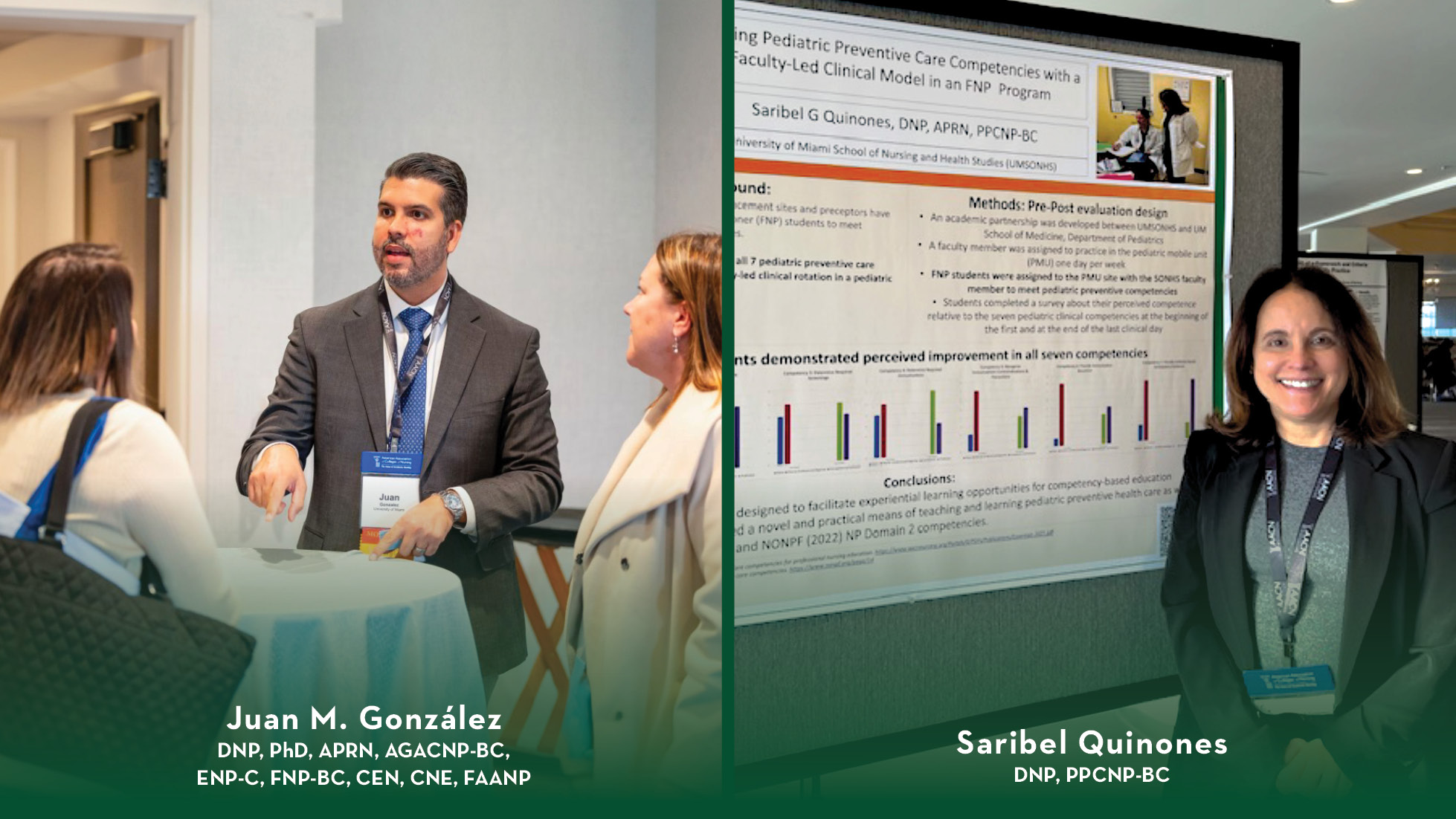For the past few years, Dr. Juan M. González, director of the adult-gerontology acute care nurse practitioner program at the University of Miami School of Nursing and Health Studies, has served on the American Association of Colleges of Nursing’s Doctoral Education Conference Subcommittee. In January, he attended the association’s 2025 Doctoral Education Conference in Coronado, California, with Dean Hudson Santos Jr. and other school faculty members. “I was meeting and greeting first-time attendees and introducing them to the conference,” said Dr. González, an associate professor of clinical. He also contributed to a “deep dive” discussion titled “Beyond the Ph.D. and the D.N.P.: Understanding Diverse Doctoral Degrees in Nursing,” and moderated two “Emerging Solutions” sessions: “Advocating for Equity: The Role of Nurses in Building Inclusive Features in Health and Education” and “Selecting Critical Curricular Concepts to Support Competency Attainment.”
Dr. Mary Mckay, a professor of clinical and the Wallace Gilroy Endowed Chair, represented the school as director of the Doctor of Nursing Program. “I also presented a poster on behalf of myself and Drs. Nicole Gomez, Greta Mitzova-Vladinov, and Cynthia Foronda that reported on the use of peer-to-peer mentoring to enhance the capstone D.N.P. scholarly project process,” said Dr. Mckay. Traditionally, faculty serve as the sole mentors to D.N.P. students, but she and her colleagues explored evidence that “peer-to-peer mentoring has been shown to improve student retention, sense of belonging, and enhanced knowledge development.” They asked 39 first-year D.N.P. students to select a second-year D.N.P. student as their scholarly project mentor. “The peer-to–peer mentoring process increased the mentees’ confidence in the D.N.P. capstone project proposal process and improved their professional growth in the American Association of Colleges of Nursing (2021) Core Competencies for Advanced-level Nursing Education,” concluded the educators, adding that implementing such programs offers “a promising approach to addressing the challenges faced by students.”
Dr. Saribel Quinones, associate professor of clinical, attended the AACN Faculty Practice Leadership Network’s Pre-Conference event, “Bridging the Gap: Intersecting Practice and Academia.” She presented “Meeting Pediatric Preventive Care Competencies with a Faculty-Led Clinical Model in an FNP Program.” The poster outlined her clinical collaboration with the Miller School of Medicine Department of Pediatrics in which advanced practice nursing students demonstrated perceived improvement in all seven pediatric preventive care competencies after their pediatric mobile unit clinical rotation. The model, reported Dr. Quinones, “offered a novel and practical means of teaching and learning pediatric preventive health care, as well as meeting AACN (2021) Essentials and National Organization of Nurse Practitioner Faculties (2022) nurse practitioner Domain 2 competencies.”
At the Ph.D. pre-conference, Dean Santos and Dr. Victoria Behar-Zusman, director of the Ph.D. in nursing science program, gained insights into “some of the macro issues in nursing Ph.D. education, including declining enrollment rates in nursing Ph.D. programs, despite growing need for nurse scientists, faculty, and leaders. “Fortunately, we were able to reverse that decline last year with strong outreach efforts,” said Professor Behar-Zusman. “Other solutions presented had to do with refining the role of the Ph.D.-prepared nurse and distinguishing it from the D.N.P., and the need for Ph.D. programs to define their strengths and specializations to give potential applicants a clear idea of what career opportunities they will have upon graduation.” The 2026 AACN Doctoral Education Conference is scheduled for January in Bonita Springs, Florida.


